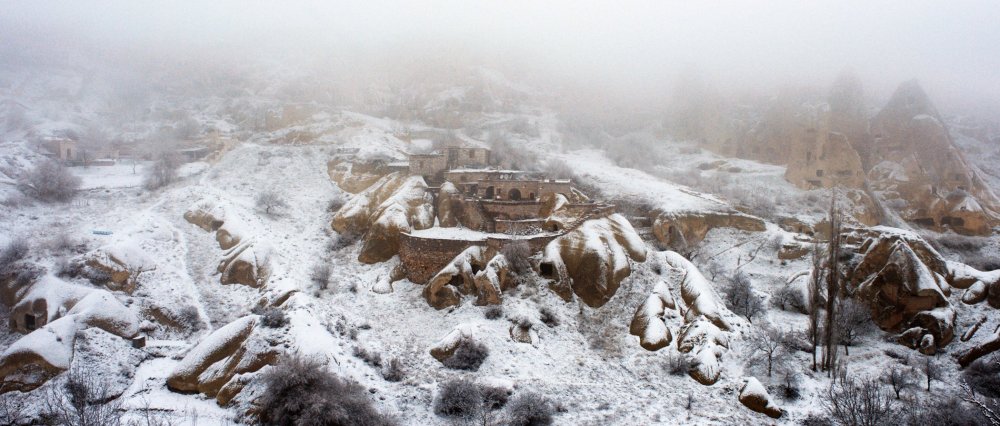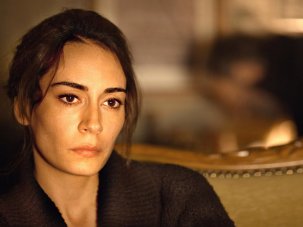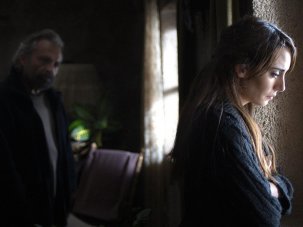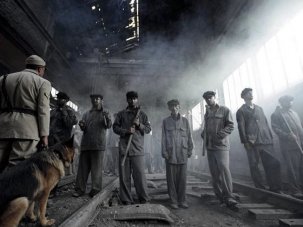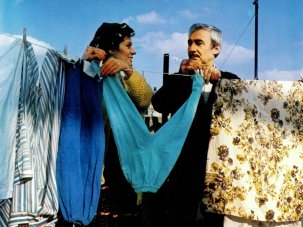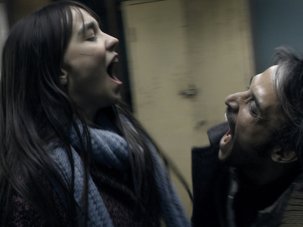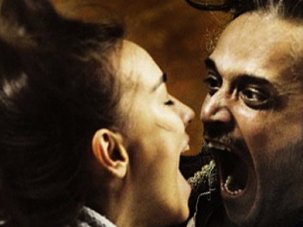One of Sight & Sound’s best films of 2014.
The end credits of Nuri Bilge Ceylan’s Palme d’Or-winning feature mention Chekhov, Shakespeare, Dostoevsky and Voltaire, all of them, it appears, directly quoted in the film.
Turkey/France/Germany 2014
Certificate 15 196m approx
Director Nuri Bilge Ceylan
Cast
Aydin Haluk Bilginer
Nihal Melisa Sözen
Necla Demet Akbag
Hidayet, driver Ayberk Pekcan
Hamdi, Imam Serhat Kilic
Suavi Tamer Levent
Levent, teacher Nadir Saribacak
Timur, hotel guest Mehmet Ali Nuroglu
Ismail Nejat Isler
Dolby Digital
In Colour
[2.35:1]
Subtitles
Distributor New Wave Films
Turkish theatrical title Kis uykusu
UK release date 21 November 2014
newwavefilms.co.uk
► Trailer
But the line that Winter Sleep most obviously brings to mind is from Sartre: “Hell is other people.” The characters in this singularly claustrophobic huis clos drama painfully tear each other apart, not least when they think they are acting with good intentions. The eager-to-please country hodja (Islamic teacher) Hamdi tries to calm the tension between his embittered brother Ismail and their landlord Aydin by taking his nephew to apologise to Aydin for vandalising his jeep; the result is worse discord. And when Aydin’s young wife Nihal tries to help Hamdi’s family by handing over a wad of banknotes, Ismail responds with devastatingly quiet contempt before flinging the money on the fire – in its depiction of unassuageable despair and pride, the most Dostoevskian moment here.
Winter Sleep is without doubt a formidably achieved, intellectually substantial drama that deals variously with questions of conscience, responsibility and self-deception. These topics catch the imagination when they are worked through in the narrative, but they grip considerably less when picked over explicitly in long, stagey discussions. Winter Sleep is a film inspired by theatre – Ceylan has long proclaimed his love of Chekhov – and filled with theatrical allusions, including the masks and posters in Aydin’s study (he is a retired actor). Understandable, then, that it should feel theatrical; but if Winter Sleep is Ceylan’s most ambitious screenplay (he co-wrote it with his wife and regular collaborator Ebru Ceylan), it is far from his most successful film.
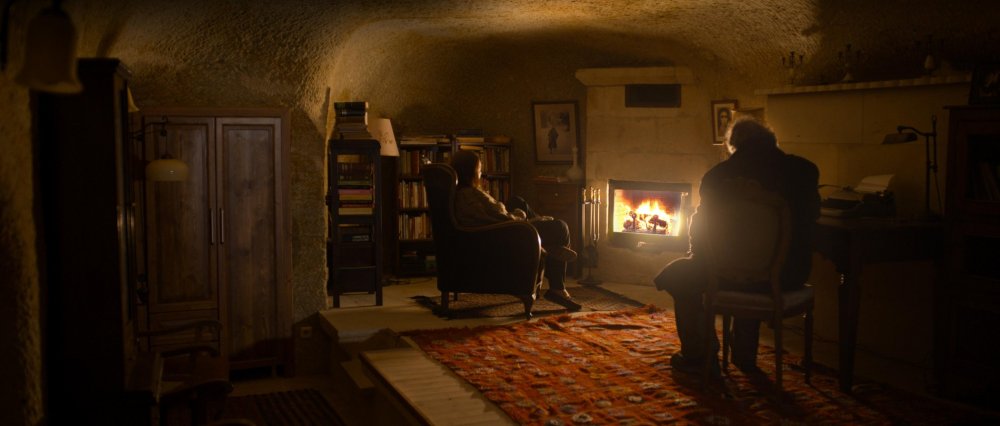
Winter Sleep (Kis uykusu, 2014)
On a first viewing in Cannes this year, my feeling was that Winter Sleep was a film to be reckoned with, and possibly a great one, but not quite one to be much enjoyed. Watching it again, I still find it hard to savour, despite many masterful qualities – and perhaps it’s because of those qualities, which never quite cohere into a dynamic whole, that Winter Sleep is all the more disappointing.
An imposing portrait of a vain, deluded, yet intensely charming man in decline – a minor-league Lear of the steppes – the drama is involved and wide-ranging, with several subplots running in tandem despite the ostensible lack of action. But for much of the time, the characters do little except talk at length, in darkened rooms. These people are nothing if not articulate, and are acted with subtle, sometimes mischievous brio; but some of the longer dialogues (the showdown between Aydin and Nihal lasts roughly 30 minutes) feel like transcribed chapters of a novel. And the emotional and intellectual shifts traced by the exchanges are not always easy to follow: it would, for example, take more than one viewing to properly gauge the dynamics of the triangle between Nihal, Aydin and the latter’s recently divorced sister Necla, who lives with them, and the (largely hidden) background to their grievances.
From a filmmaker who is also held to be a landscape photographer of considerable brilliance, Winter Sleep is highly perverse: set in a breathtaking setting, the mountainous expanses of Cappadocia, the film gives us several striking outdoor moments, yet chooses to keep us mostly indoors, in the cave-like rooms of the hotel where Aydin has essentially dug in to shelter (hibernation is one meaning of the title; another is the implication that he is sleepwalking through the final act of his life). There is a dramatic logic to the play of interior and exterior, emphasised by Gökhan Tiryaki’s widescreen photography; we feel the enclosure all the more because of what we’ve glimpsed outdoors, and when we head out again, it feels like a welcome escape. Yet the film is claustrophobically static for long stretches, and the moments when Winter Sleep finds its dramatic life only underline the heaviness of the rest.
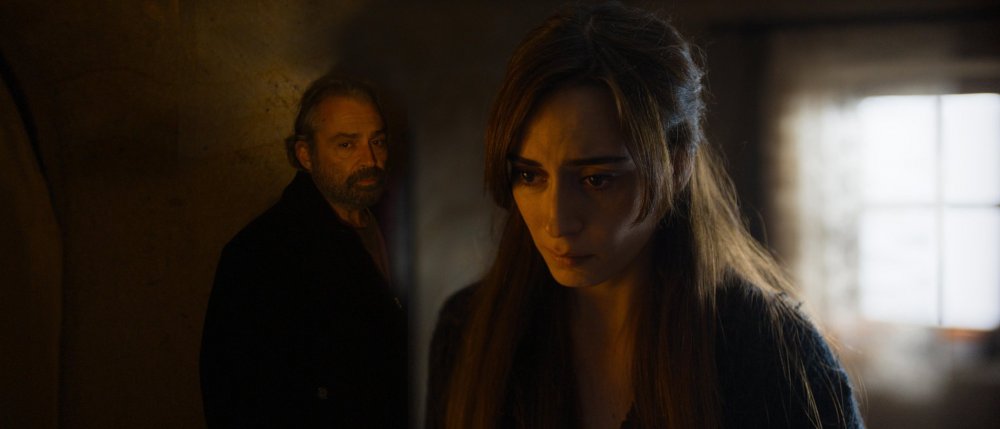
Winter Sleep (Kis uykusu, 2014)
But when Winter Sleep comes alive, it is as powerful and suggestive as any Ceylan film. The script plays the long game, setting up early crises that play out much later: a chat with a visiting motorcyclist leads to Aydin’s having a wild horse captured, then much later releasing it, in a mesmerising night shot; and Aydin’s early visit to Hamdi is echoed at the end in Nihal’s humiliating encounter with Ismail.
This latter scene puts the stamp on Winter Sleep as the work of a magnificent director of actors. However finely sketched the character of Hamdi is in the script, as a man trying to please everyone and maintaining a tenuous grip on his own dignity in the process, his dilemma most deeply finds its meaning in actor Serhat Kilic’s painfully ambivalent grin. The three lead performances are superb, with Demet Akbag having a showstopping moment as Necla, coolly demolishing her brother from the comfort of his own sofa.
But it’s in their silence that these performances are often the most eloquent; the film offers a prize instance of the Kuleshov effect, as Melisa Sözen’s Nihal confronts Haluk Bilginer’s Aydin, and Ceylan keeps cutting back to Bilginer, barely changing as he half-smiles through his grizzled beard, although his look seems to mean something different in every shot. It is such quietly but resonantly cinematic moments that offer a glimpse of the great film in Winter Sleep, as opposed to the ambitious, intellectually rigorous but rather laborious screen novel that it ultimately is.
-
Sight & Sound: the December 2014 issue

The making of 2001: A Space Odyssey, plus David Thomson on westerns, the rise of Christianity movies, Winter Sleep, Leviathan, Life Itself and much...
-
The Digital Edition and Archive quick link
Log in here to your digital edition and archive subscription, take a look at the packages on offer and buy a subscription.




